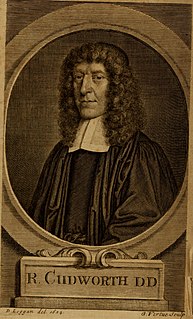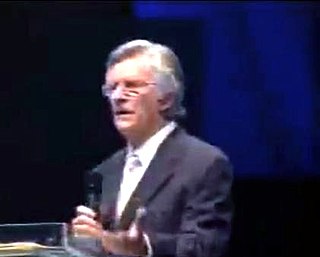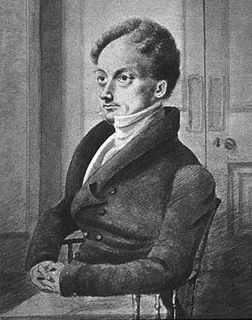A Quote by John Calvin
Then let every one of us, being warned by this sentence of the angel, acknowledge that he as yet cleaves to first principles, or, at least, does not comprehend all those things which are necessary to be known; and that therefore progress is to be made to the very end of life: for this is our wisdom, to be learners to the end.
Related Quotes
Even the Atheists... readily acknowledge it for an indubitable truth, that there must be something... which was never made or produced - and which therefore is the cause of those other things that are made, something... whose existence must needs be necessary... Wherefore all the question now is, what is this... self-existent thing, which is the cause of all other things that are made.
The real essence, the internal qualities, and constitution of even the meanest object, is hid from our view; something there is inevery drop of water, every grain of sand, which it is beyond the power of human understanding to fathom or comprehend. But it is evidentthat we are influenced by false principles to that degree as to mistrust our senses, and think we know nothing of those things which we perfectly comprehend.
The world that we live in is full of distractions and pleasures that pull us away from a spiritual life. Even our jobs which are a very necessary and important part of our lives can end up being the altar at which we pray. They consume most of our waking hours and provide the income on which we are dependent in order to take care of our families.
The Word says, ‘Love not the world, neither the things that are in the world’ (1 John 2:15). Jesus warned, ‘Beware of covetousness: for a man’s life does not consist in the abundance of the things which he possesses’ (Luke 12:15). Things—our possessions—can tie us down to this world. While heaven and hell prepare for war, we go shopping. Eternal values are at stake! The end of all we know is near—and we are busy playing with our toys!
We, however, want to become those we are--human beings who are new, unique, incomparable, who give themselves laws, who create themselves. To that end we must become the best learners and discoverers of everything that is lawful and necessary in the world: we must become physicists in order to be able to be creators in this sense--while hitherto all valuations and ideals have been based on ignorance of physics or were constructed so as to contradict it. Therefore: long live physics! And even more so that which compels us to turn to physics--our honesty!
Whenever the powers of government are placed in any hands other than those of the community, whether those of one man, of a few, or of several, those principles of human nature which imply that government is at all necessary, imply that those persons will make use of them to defeat the very end for which government exists.
Our being edified at conference depends on us. It becomes necessary that we prepare our hearts to receive and profit by the suggestions that may be made by the speakers during the progress of the conference, which may be prompted by the Spirit of the Lord. I have thought, and still think, that our being edified does not so much depend upon the speaker as upon ourselves.
Those who are accustomed to judge by feeling do not understand the process of reasoning, because they want to comprehend at a glance and are not used to seeking for first principles. Those, on the other hand, who are accustomed to reason from first principles do not understand matters of feeling at all, because they look for first principles and are unable to comprehend at a glance.
That man is formed for social life is an observation which, upon our first inquiry, presents itself immediately to our view, and our reason approves that wise and generous principle which actuated the first founders of civil government, an institution which hat its origin in the weakness of individuals, and hath for its end the strength and security of all; and so long as the means of effecting this important end are thoroughly known and religiously attended to government is one of the richest blessings to mankind, and ought to be held in the highest veneration
The best moments on earth are those during which we meditate upon heavenly things in general, when we recognize or defend the truth, that heavenly dweller and denizen. Only then do we truly live. Therefore, the essential interests of the soul require that we should oftener rise above the earth, upwards to heaven, where is our true life, our true country, which shall have no end.
I saw full surely that ere God made us He loved us; which love was never slacked, nor ever shall be. And in this love He hath done all His works; and in this love He hath made all things profitable to us; and in this love our life is everlasting. In our making we had beginning; but the love wherein He made us was in Him from without beginning: in which love we have our beginning. And all this shall we see in God, without end.
Patience is a virtue, but there comes a moment when you must stop being patient and take the day by the throat and shake it. If it fights back; fine. I'd rather end up bloody at the end of the day, then unhurt with no progress made, no knowledge gained. I'd rather have a no, then nothing. I'd forgotten that about myself.
But in the end, science does not provide the answers most of us require. Its story of our origins and of our end is, to say the least, unsatisfactory. To the question, "How did it all begin?", science answers, "Probably by an accident." To the question, "How will it all end?", science answers, "Probably by an accident." And to many people, the accidental life is not worth living. Moreover, the science-god has no answer to the question, "Why are we here?" and, to the question, "What moral instructions do you give us?", the science-god maintains silence.
I would like, then, to end by putting in a good word for the non-industrious poor. At least they aren’t hurting anyone. Insofar as the time they are taking time off from work is being spent with friends and family, enjoying and caring for those they love, they’re probably improving the world more than we acknowledge.






































